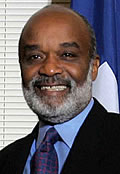should foreign aid be privatized?
< Previous | Home | Next >
"NDI underwent 51/2 years of harassment and stuck to it," said Leslie Campbell, regional director for the Middle East and North Africa, who was in Cairo last week. "I feel the partners we stuck by are grateful now."
This Story
*
Egyptians celebrate but keep protesting in Cairo
*
U.S. offers aid for Egyptian democracy, but quietly
Even government agencies, such as the U.S. Agency for International Development, ran into stiff resistance.
One USAID--financed program sought to provide civic education to Egyptian schoolchildren.
But the Egyptian government balked, returning 60,000 unopened books to the sponsoring organization, according to a 2009 report by the inspector-general for USAID.
The United States has spent an average of $2 billion a year here since 1979, viewed as reward to Egypt for peace with Israel.
More than half has gone to military assistance, requiring Egypt to buy U.S. equipment.
The protesters who stood for democracy in Tahrir Square were shot at with American bullets, gassed with American tear gas and bound by American handcuffs.
Targeting aid
Many Egyptians who do favor American aid argue that it should be targeted at the economy and channeled through private organizations rather than the bureaucracy, which is widely accused of corruption.
"Aid should not be used to support power.
It should instead be used as an opportunity for real friendship," said Ahmed el-Naggar, editor in chief of the Economic Strategy Trends Report published by the Al-Ahram Center for Political and Strategic Studies.
"It should be unconditional because it otherwise risks being associated with policies rather than with popular needs."
Most of the $150 million available now, from earlier unspent funds for the country, is intended for economic assistance, including job creation, job training and education.
But advocates for democracy programs argue that those must be a priority.
Historically, the majority of non-military American aid has gone to the economy.
Beginning in 1979, $815 million a year was devoted to infrastructure.
Where raw sewage once ran in the streets of Cairo, treatment systems were built.
Irrigation systems came to the countryside.
In recent years, U.S. non-military aid was spread among economic, education, health and democracy initiatives.
Aid for such areas dropped from about $450 million in 2007 to roughly $250 million in 2011, and the Obama administration has been criticized for reducing pro-democracy assistance.
"We're in a different place now. There is a firm commitment by this administration to provide assistance in real time to make the democratic transition real and successful," said Mike Posner, assistant secretary of state for democracy and human rights.
The immediate priority of U.S. pro-democracy funds, said Dan Brumberg, a Middle East democracy specialist at the U.S. Institute of Peace, should be to support the development of political parties.
"Political scientists generally agree, when the window of opportunity for parties opens up, it has to be addressed pretty quickly," he said. "It closes as well."
ad_icon
Sheridan reported from Washington.
Brian Andrew, March 4 2011, 3:30 PM
Start a NEW topic or,
Jump to
previous | Next Topic >
< Previous | Home | Next >
Messages in this topic
< Previous | Home | Next >

 Rene Preval and Congressman Hank Johnson
Rene Preval and Congressman Hank Johnson  Rene Preval and Josette Sheeran
Rene Preval and Josette Sheeran  Rene Preval Making a speech
Rene Preval Making a speech  President Rene Preval and Hillary Clinton
President Rene Preval and Hillary Clinton  PHOTO: Haiti President Rene Preval and Bill Clinton in New York
PHOTO: Haiti President Rene Preval and Bill Clinton in New York  President Rene Preval
President Rene Preval  Rene Preval and Stephen Harper, Canada Prime Minister
Rene Preval and Stephen Harper, Canada Prime Minister  Bill Clinton in Haiti Palais National
Bill Clinton in Haiti Palais National  Rene Preval and Mahmoud Ahmadinejad
Rene Preval and Mahmoud Ahmadinejad  Rene Preval and Condoleezza Rice
Rene Preval and Condoleezza Rice  Should Michele Pierre Louis B E Pm Of Haiti
Should Michele Pierre Louis B E Pm Of Haiti  Did Obama Respect Preval Summit America 2009
Did Obama Respect Preval Summit America 2009  Caribbean News From Caribworldnews
Caribbean News From Caribworldnews  Discour Pres Preval Fete Drapeau Arcahaie
Discour Pres Preval Fete Drapeau Arcahaie  Secretary Clinton Remarks With President Preval Of Haiti
Secretary Clinton Remarks With President Preval Of Haiti 

